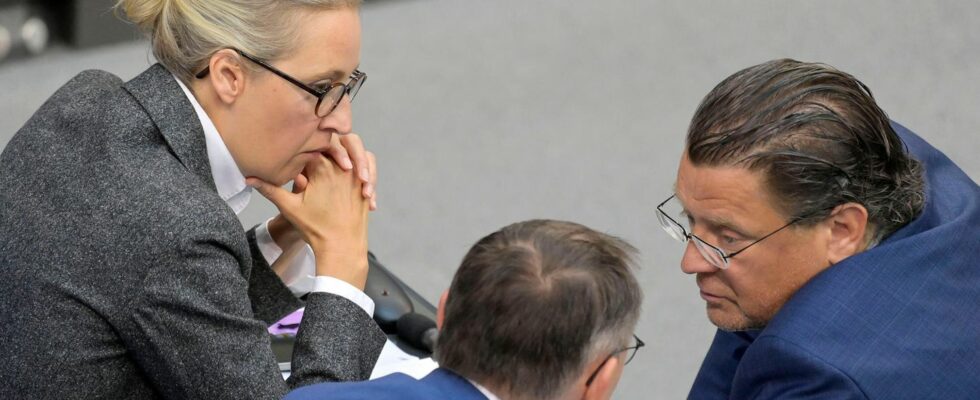New investigations, decisions and revelations are constantly putting the AfD in trouble shortly before the European and local election campaigns. Why this week was particularly wild even for the scandal-prone party.
The plenary hall of the Bundestag, on Thursday morning, 9:30 a.m.: AfD MP Stephan Brandner, who also happens to be the parliamentary group’s legal advisor, leans over to his two chairmen and speaks to them. While Tino Chrupalla listens stoically, Alice Weidel puts her hand to her forehead and then shakes her head.
The news is, once again, pretty bad for the AfD. The responsible committee has recommended lifting the immunity of MP Petr Bystron, the man who is in second place on the party’s European election list. The MPs in the plenary chamber voted in favor by a large majority. Only the AfD abstains from the committee, as before.
For the AfD, the moment is the negative climax of a week that the party has not experienced in a long time: As the European elections (and the local elections in nine federal states) get closer and closer, the Berlin office of one of its most important candidates is being searched. The Munich Public Prosecutor’s Office’s initial suspicion is bribery and money laundering; the raid also hits properties in Bavaria and Mallorca. But it won’t stay that way.
The catastrophe week for the AfD began in a hearing room at the Münster Higher Administrative Court. There on Monday morning, the presiding judge, Gerald Buck, said this sentence: His chamber had found “sufficient factual evidence” that the AfD’s policies were directed “against the human dignity of certain groups of people and against the principle of democracy.” That’s why it’s completely okay that the Federal Office for the Protection of the Constitution has classified the entire party as a so-called suspected case. “The defensive democracy is not a toothless tiger,” summed up Buck.
The AfD’s delaying tactics have failed
Weidel countered with maximum fury. “An Office for the Protection of the Constitution that is exploited by party politics to bully political competition is itself unconstitutional,” she said.
But it couldn’t cover up the failure of the AfD strategy. After all, the party had repeatedly tried to prevent a decision being made before the European elections on June 9th. In vain: the image remains damaged. And the Office for the Protection of the Constitution can continue to monitor the federal party with part of its intelligence resources.

Two scandals in one day: “AfD can no longer get out of negative headlines”
02:04 minutes
Speaking of the Office for the Protection of the Constitution: the authority can even use its entire range of tools against the Thuringian AfD. The regional association has been classified as a “secure right-wing extremist effort” since March 2021 and is therefore considered a “case under observation”. This is mainly due to state chairman Björn Höcke – who, and this was the next bad news for the party on Tuesday, was sentenced to a fine of 13,000 euros by the Halle regional court. From the court’s perspective, he intentionally violated Section 86a of the Criminal Code, which prohibits the use of license plates from former Nazi organizations, when he shouted the SA slogan “Everything for Germany” at an AfD rally.
New allegations against Krah
And that wasn’t all. Also on Tuesday, ZDF and “Spiegel” published new findings about Maximilian Krah. The AfD’s top EU candidate has since been suspended from the election campaign because federal prosecutors accuse his employee Jian G. of spying for China. Jian G. is therefore in custody. Now it is reported that Krah’s Brussels office gave a certain Janusz N. access to the European Parliament. According to the Warsaw public prosecutor’s office, the Pole is said to have worked for the Russian secret service.
On Wednesday, “Zeit” published an interview with the President of the Federal Constitutional Court in which he expressly defended the instrument of party banning. The German parties, said Stephan Harbarth, are stronger in international comparison than in most other countries. “That’s why the potential threat that an anti-constitutional party can develop in Germany is greater than in other political systems.”
Of course, Harbarth repeated what the legal majority opinion is – namely that a ban can only be “the complete last resort”. “No political opinion should simply be silenced because it doesn’t suit those in power,” he said.
And yet: The fact that a party ban is being discussed again is unpleasant for the AfD. The debate strengthens their victim narrative, which can be used for mobilization in East Germany, where three state parliaments will be elected in September. But in the upcoming European elections, it is primarily the West that counts, where 80 percent of those eligible to vote live. And there the party still has to preserve remnants of a bourgeois image.
And what’s next?
This made Thursday’s developments all the more devastating for the party. While prosecutors and police officers were still searching Bystron’s offices and apartments, the Bundestag voted to lift the immunity of AfD MP Hannes Gnauck. It’s about disciplinary proceedings from his time in the Bundeswehr.
Gnauck is also important in the party. As chairman of the “Junge Alternative”, which is classified by the Federal Office for the Protection of the Constitution as “certainly right-wing extremist”, he is at the head of the next AfD generation. In his case, the parliamentary group defiantly voted against lifting immunity – which, of course, did not change the result. The proceedings against the MP can begin.
As usual, the AfD complains in all possible ways about an alleged campaign by the judiciary, politicians and the media. It is usually said that the verdicts are wrong and the investigations are unfounded.
On the other hand, caution can also be discerned, especially from the messages from Chrupalla and Weidel. Because what if the audio recording is soon to be heard that is supposed to prove that Bystron accepted cash from Russian sources? And what if the money that is said to have gone to Krah’s MP office from suspected spy Jian G. comes from China?
After all, it’s only Friday.



